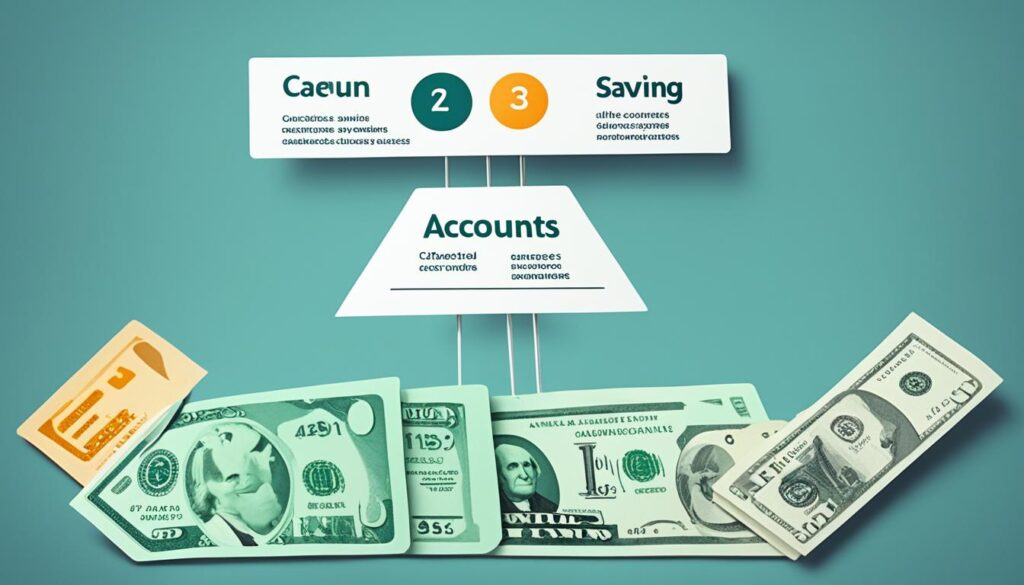A business savings account is made for small business owners to keep earnings for later use. It makes it easy to get your money when you need it. This can keep your business financially healthy in the long term.
Starting with small amounts to save is fine. Over time, you can grow your savings. Saving about 10% of your profits is a good idea. Using this account as part of your business budget is also smart.
Regularly saving in this account can help you in many ways. For one, you can build a strong financial base for future investments. Also, for any sudden costs, it’s great to have some funds ready.
A big plus is being prepared for surprises. If you face a sudden cash flow problem or a big, unexpected cost, your savings can help. This way, your business can keep running smoothly.
This account also helps with tax payments. By saving some money throughout the year, you will be ready when tax time comes. This can help you avoid any unexpected financial pressures.
Plus, you get interest on your savings. While the rates might not be high, over time, it can really add up. This growth helps your savings increase without you doing anything extra.
Another benefit is using this account for your retirement savings. By regularly setting some money aside, you are also planning for your future.
Lastly, know that the FDIC (Federal Deposit Insurance Corporation) protects your funds. It ensures your savings, up to $250,000 per person, are safe.
Key Takeaways:
- A business savings account is made for small business owners to save earnings for future business needs.
- It allows easy access to your money and helps keep your finances healthy long term.
- Save part of your profits to get ready for unexpected events and for tax payments.
- Your savings account earns interest and is a good way to add to your retirement funds.
- The FDIC protects your savings up to $250,000 per owner, giving you peace of mind.
Benefits of a Business Savings Account
A business savings account has many perks for small business owners. It’s great for planning for unexpected costs, putting money aside for taxes, and earning interest. It also helps with retirement savings and keeps your money safe with FDIC insurance.
“A business savings account provides financial security and peace of mind, allowing business owners to navigate unexpected events without compromising their cash flow.”
One key benefit is preparing for the unexpected. It’s a safety net, ready for those times you must fix things or when income drops. With a cushion like this, business owners can keep things running smoothly.

This account is also perfect for saving for taxes. By keeping tax money separate, you avoid cash flow problems. Plus, you won’t scramble for funds come tax season.
Earning interest with this account is a plus too. Although rates may not be high, it all adds up. Over time, this can help with long-term saving goals or a retirement plan.
Last, it keeps your money secure. With FDIC, funds are safe up to $250,000 if the bank goes under. This protection is essential for business owners aiming to protect their earnings.
To wrap up, having a business savings account greatly benefits small business owners. It’s ideal for unexpected costs, saving for taxes, and earning interest. And, with FDIC insurance, your funds are always secure.
Types of Business Savings Accounts
Trying to find the right business savings account means looking at what banks offer. Each account type has its own features and benefits. Knowing your options helps business owners choose what’s best for their goals.
Here are some common types of business savings accounts:
- Standard Business Savings Account: This is the most common account type. It offers a good interest rate and lets you get your money easily. You can start it with a small deposit, which is great for any business.
- High-Yield Business Savings Account: It has a better interest rate than the standard one. This account is for businesses saving larger amounts who want to earn more.
- Money Market Account: It’s like a mix of a savings and checking account. You get a high interest rate and can write a few checks. It’s perfect for earning more while still easily using your money.
- Certificate of Deposit (CD) Account: With a CD, you put in a set amount for a fixed time. The bank then guarantees you an interest rate. But you can’t touch the money until the term ends.
Before you choose a savings account, look at different banks and what they offer. Some places might have better deals or extras. You should also check how much you need to deposit and if there are any fees.
Choosing the right business savings account can help your savings grow. It keeps your business secure financially.

Setting Up a Business Savings Account
Opening a business savings account requires specific documents and IDs. It’s smart to gather them ahead of time for a smooth process. Here’s what’s usually needed:
- Business formation documents: This includes papers showing your business type, like sole proprietorship or a corporation.
- Business license: A valid business license confirms your business is real. Most banks want to see this.
- Employee Identification Number (EIN): An EIN is like a social security number for businesses. It’s for tax purposes and for opening the account.
It’s crucial to check with your bank on their exact needs. They might ask for extra documents based on their rules.
With all your paperwork ready, opening the account should be straightforward. You’re on your way to better business financial management and saving for tomorrow.
Illustration Example:
Here’s a handy example of what you might need to open a business savings account:
| Required Documents | Identification |
|---|---|
| Business Formation Documents (e.g., Articles of Incorporation, Certificate of Organization) | Valid Driver’s License or Passport |
| Business License | Social Security Number or EIN |
| Employee Identification Number (EIN) | Proof of Address (e.g., Utility Bill) |

How to Manage Funds in a Business Savings Account
To handle funds in a business savings account well, you need a clear plan that fits your business goals. Being the boss means you get to pick a saving method that matches your financial situation.
Savings Approach:
It’s smart to set aside a part of your earnings on a regular basis. For instance, putting away 10% of your profits each month can be a good start. This way, you steadily save money over time.
If you like more flexibility, you might choose to save only when you can. This could mean saving a certain amount at the end of each week or month. It’s a more relaxed way to save while still being consistent.
Integration into Your Business Budget:
It’s key to weave your saving plan into your overall budget. First, figure out how much of your income you can save after considering all expenses. It might be wise to seek advice from a financial expert to ensure your budget balances saving with other needs well.
Review and Adjustments:
It’s important to regularly check and tweak your savings plan. As your business and personal life change, so might your saving needs. Also, things like the economy and market trends can influence your strategy. Stay alert and make adjustments to keep your savings plan working effectively.
Applying Saving Strategies:
Here are a few tips to make managing your funds easier:
- Automated Savings: Use automatic transfers to move money from your checking to savings account without thinking about it. This way, you save continually.
- Separate Accounts: Have multiple savings accounts for things like emergencies, taxes, or special projects. This makes it easier to keep track of what you’re saving for.
- Interest-Bearing Accounts: Look for savings accounts with good interest rates. Earning interest can boost your savings over time.
By wisely handling your business savings, aim for growth while keeping a solid financial cushion for your company.

Business Savings Account vs. Checking Account
Understanding the distinction between a business savings account and a business checking account is vital for your business finances. Each has unique purposes and features that cater to specific business needs.
A business savings account helps save and grow money through interest. It’s great for keeping funds for bigger investments, emergencies, or future plans. You’ll see your money grow with the interest it earns.
On the flip side, a business checking account is for daily transactions and managing cash. It gives easy access to your money for buying supplies or paying bills. It comes with helpful tools like check writing and a debit card.
Here’s a head-to-head on what each type offers:
| Factor | Business Savings Account | Business Checking Account |
|---|---|---|
| Transaction Management | Best for transactions that don’t need immediate money access | Made for everyday transactions and cash handling |
| Interest Rates | You earn interest on the money you put in | Usually doesn’t earn interest |
| Fees | May have small fees or maintenance charges | There might be transaction or monthly fees |
| Account Features | Mainly for saving and growing funds | Comes with tools like checks and debit cards |
When picking between the two, think about what your business really needs. Look at transaction needs, interest on savings, fees, and the features you want. The best choice depends on whether saving long-term or easy daily transactions are more important to you.
Many businesses benefit from having both types of accounts. This way, they can manage money effectively. They also keep their savings safe and growing while having money available for day-to-day use.
For the wisest choice, compare what different banks and institutions offer. Look at their rates, fees, and extra services to find what fits your business plans and financial needs best.
Benefits of a Business Checking Account
A business checking account is important for managing a company’s cash. It helps with both putting money in and taking it out. This makes dealing with money smoother and more effective.
A big plus of a business checking account is its flexibility. You can add or take out money in many ways. These include ACH transfers, wire transfers, and of course, using cash. Such variety makes business easier and offers flexible payment options.
Many banks now offer online and mobile banking for business accounts. This lets business owners check their accounts, pay bills, and more from anywhere. Online banking makes managing money simpler and saves time for busy folks.
Business accounts also have handy features like check writing and debit cards. Checks help with traditional payments. And debit cards make buying things quick and safe.
Keeping an eye on business spending is key. A business checking account helps to do this. It keeps a record of all transactions. This makes budgeting and tax preparation easier.
Transaction Limits and Considerations
Choosing a business checking account? Think about the transaction limits set by the bank. These could be on withdrawals, monthly transactions, or cash amounts. Make sure these match your business’s needs.
Don’t forget about the minimum balance needed to avoid fees. Check if your business can keep up with it. This ensures the account fits your financial plans.
Interest rates for business checking accounts might be lower than savings accounts. But, comparing rates is still smart. It helps earn more on your money.
In the end, a good business checking account offers ease, features, and meets your business’s needs. Picking the right one can help your business run smoothly. It allows you to focus on what really matters—making your business grow.
Factors to Consider When Choosing a Business Savings Account
When you pick a business savings account, several things matter. You should look at what they offer to fit your business’s money needs. The main things to think about are:
FDIC Insurance
Choosing an account with FDIC insurance is a must. This keeps your money safe if the bank fails, for up to $250,000. Having this insurance means your savings are secure.
Interest Rates
The account’s interest rate is also key. Always compare rates to boost your earnings. Even a slight difference can help your savings grow faster over time.
Fees
Watch out for account fees like monthly or ATM fees. Also, check for minimum balance needs. Make sure the fees are fair for what you get from the account.
Introductory Promotions
Many banks have special deals for new account holders. This could mean better rates or no fees for a while. Use these offers to save more and spend less at first.
Withdrawal Limits
Know the bank’s rules on how much you can take out. Going over these limits could lead to fees or blocks on your cash. Make sure these rules match your business’s needs and future plans.
Considering these points helps you choose wisely. This way, your savings account supports your business and its financial health.
Benefits of Using Accounting Software for Managing Business Savings Account
Accounting software can really help handle and improve a business savings account. It uses advanced features and automation to make financial tasks simpler. This lets business owners spend more time on important activities and big choices.
One key benefit is how easy it is to track finances with this software. It keeps perfect records of money going in and out. This gives a clear picture of the account’s activity. It also helps spot any mistakes in the records.
Managing money wisely is key, and the software is great at this. It shows detailed reports and analysis. These allow owners to watch their savings and spot trends. By making decisions based on data, they can plan ahead better.
Accounting software also shines when it comes to handling invoices. This feature makes creating and sending invoices much easier. It also ensures timely payments. This helps keep the business’s financial health strong.
Another area it helps with is managing cash flow. It offers a look at the money coming in and going out in real-time. This makes it easier to predict any financial bumps ahead. With these forecasts, businesses can plan to avoid any money troubles.
Using this software means business owners can smartly manage their savings. It lets them track money, know their financial situation, handle invoices easily, and manage cash flow well. It’s all about making solid decisions to help the business save more.
Choosing good accounting software is a wise, long-term move. It boosts financial efficiency and ensures accurate records. This helps businesses deal with the challenges of managing their savings with more confidence.
Key Benefits of Using Accounting Software for Managing Business Savings Account:
- Effortless tracking of financial transactions, including savings deposits and withdrawals
- Accurate financial tracking and insights into the business’s cash flow
- Streamlined invoice management for timely collections and optimized cash flow
- Real-time visibility into income and expenses for effective cash flow management
- Enhanced financial efficiency and decision-making through technology
| Benefits | Accounting Software | Traditional Methods |
|---|---|---|
| Financial Tracking | Automated reports and analytics | Manual calculations and spreadsheets |
| Invoice Management | Streamlined creation, sending, and tracking of invoices | Manual invoice creation and tracking |
| Cash Flow Management | Real-time visibility and accurate forecasts | Manual calculations and estimations |
Using Business Savings to Grow and Give Back
A solid business savings account is vital for growing a company and helping communities. By saving up and building financial resources, businesses can grow smartly. They can do this by buying out underperforming competitors. These buyouts help businesses grow and reach new customers. This boosts their position in the market.
Also, a strong business savings account helps companies hire the best people. With enough money, companies can offer great pay and perks. This makes them stand out and helps in keeping talented employees. In today’s competitive world, skilled staff is key to ongoing success.
Moreover, saving up in a business account also lets companies give back. They can set aside money for community projects. Support can be through giving to local charities or helping certain groups. This shows the company cares, which is good for its image.
“Investing in the growth and well-being of the community not only enhances a company’s reputation but also fosters goodwill among its stakeholders.”
Investing in communities boosts a company’s image and trust. This approach wins over customers and employees. They like companies that support their communities. So, giving back is not only good for society but also for a company’s brand and loyalty.
To conclude, a strong business savings account is the key to future success. Businesses can use these savings to grow, hire well, and improve their products. At the same time, they can also give back to communities. This supports social causes and boosts their reputation. This balance is central to a business’s lasting growth and impact on society.
Comparison of Business Savings Account vs. Community Impact
| Benefits | Business Savings Account | Community Impact |
|---|---|---|
| Company Growth | Strategic acquisitions, market expansion | Building stronger communities |
| Attracting Talent | Competitive compensation packages | Fostering goodwill and reputation |
| Investing in Intellectual Property | Ensuring industry leadership | Supporting local programs and initiatives |
| Enhancing Brand Image | Reputation for financial stability | Emotional connection with consumers |
Conclusion
Using a business savings account the right way has many advantages for small business owners. It gives a safe place to save money for emergencies. This ensures the business stays financially strong over time. Business owners can save part of their profits for taxes. Plus, they can earn interest on these savings. This helps in growing retirement funds while enjoying FDIC insurance protection.
It’s key to have a smart savings plan that fits the business’s dreams. This might mean saving a certain part of earnings regularly. Or it could be setting fixed saving goals each week or month. By making saving part of the business’s financial plan, owners can efficiently handle their money. They can also watch their savings grow.
Selecting the right business savings account is crucial. Owners should look at interest rates, fees, and features. It’s wise to compare various accounts to find what meets the business’s needs. Also, using accounting software can really help. It makes keeping track of financial details easier, ensuring everything is in order.
By being wise with financial choices and using a business savings account effectively, businesses can grow and stand firm financially. With the right savings account, they can save for the future, manage funds well, and help their communities. This leads to greater financial success all around.
FAQ
How do I use a business savings account?
A business savings account helps small business owners save their money. You can start with small deposits and add more over time. It’s smart to save some of your profits, about 10%, to keep your budget strong.
What are the benefits of having a business savings account?
There are lots of good things about a business savings account. It prepares you for surprises, lets you save for taxes, and earns you a bit of money back. You can also add to your retirement and your money is safe. FDIC insurance protects it.
What types of business savings accounts are available?
What you get in a business savings account depends on the bank. Check out your options before you decide. Some accounts might earn more interest or have extra features.
What do I need to open a business savings account?
To start, you need your business papers, like for a sole proprietorship or an LLC. You also need a business license and an EIN. Different banks might ask for other things, so it’s good to ask what they need.
How do I manage funds in a business savings account?
Managing your account means saving money that fits your business’s plans. You can save some money from your sales regularly, when you can, or a set amount each week or month.
How does a business savings account differ from a business checking account?
A business savings account is mainly for saving and makes a little interest. On the other hand, a checking account is for day-to-day money needs. It lets you write checks and use a debit card for easy spending.
What are the benefits of having a business checking account?
A checking account is for spending and getting money. It works with many payment types, such as ACH, wires, and cash. Features like checks and a debit card make it easy to pay bills and track spending.
What factors should I consider when choosing a business savings account?
When you look for an account, think about FDIC protection, interest rates, fees, and any deals they offer. Also, consider how you can take your money out. It’s wise to compare what different banks give you.
How can accounting software help in managing a business savings account?
Accounting software makes it easy to watch your savings account by tracking your money movements. It helps keep your spending data accurate, shows you cash flow trends, and manages invoices. This gives you a good look at your company’s financial well-being.
How can a business savings account be used to grow and give back?
A strong savings account lets your business take on new opportunities, like buying other companies or making investments. It also lets you support your community, which can be good for your brand and help others.
Why is using a business savings account beneficial?
Saving in a business account has many good points. It helps you get ready for the unexpected, save for taxes, earn interest, and plan for retirement. With the right management and the best account for your needs, your business can do well and stay secure financially.




















